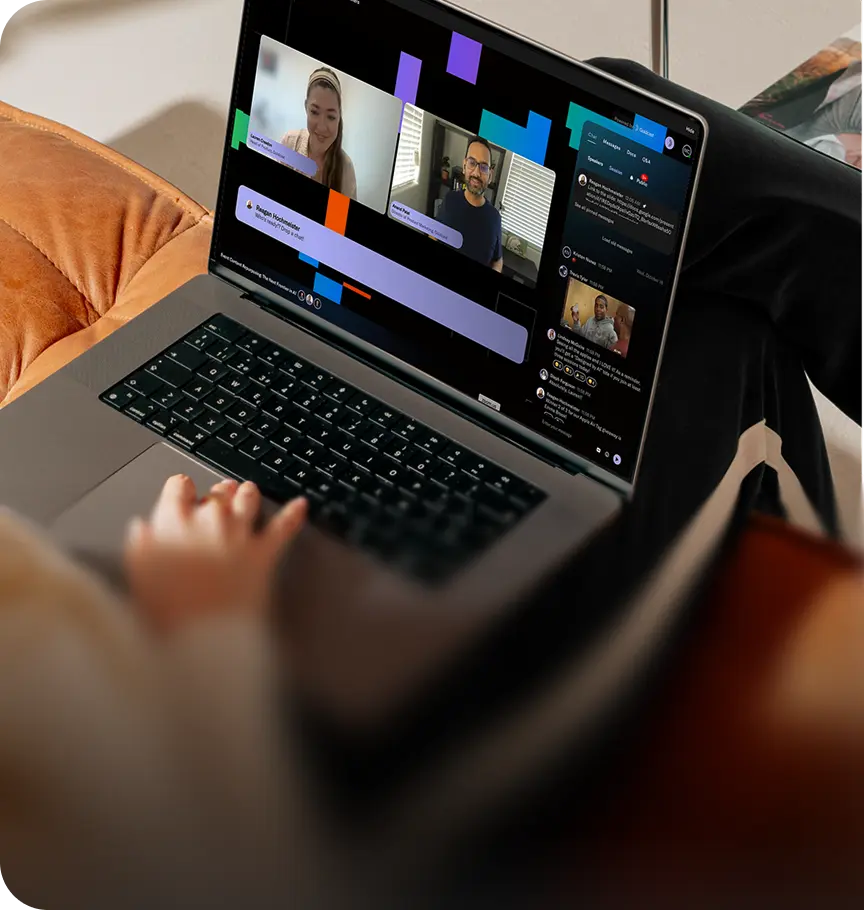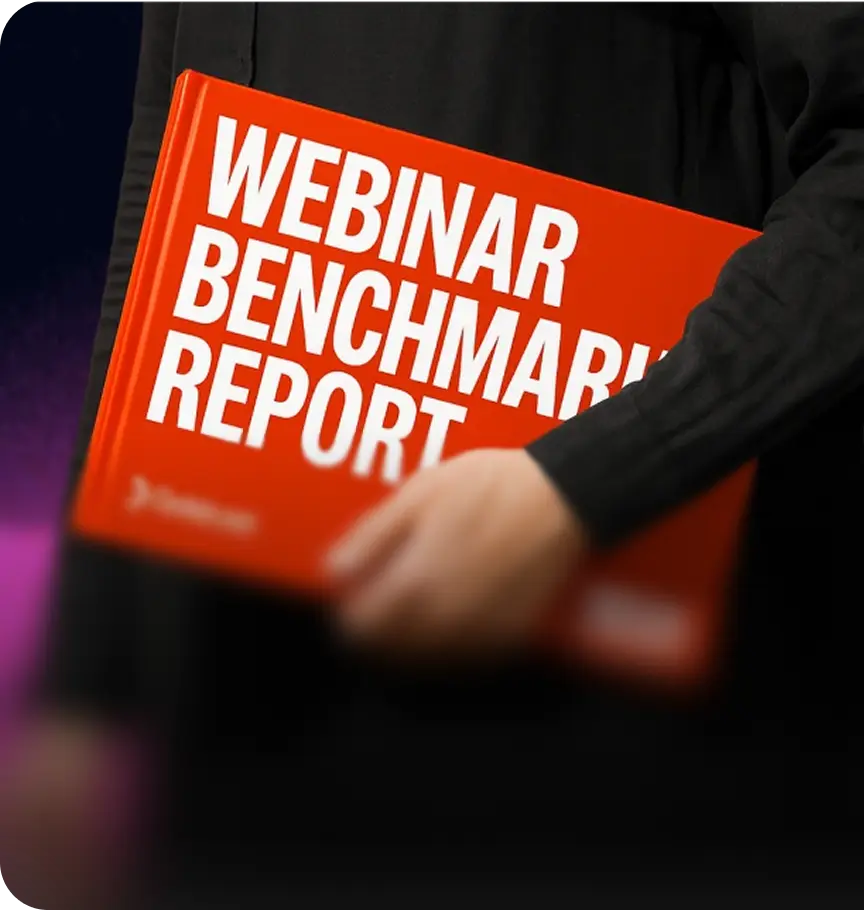Why Video-First Content Matters Most for Mindshare Marketing

Table of Contents
Maximize Your Marketing ROI
Join 10,000 other marketers already getting the best tips on running engaging events that boost pipeline and create raving fans.
"You just know it when you feel it."
What makes a message truly land?
As a marketer, I've spent years studying why certain content cuts deep, while other (arguably better) ideas fall by the wayside, largely unnoticed.
The truth: it's hard to define why some things stick, but people certainly know how that feels. And I've seen that video is always at the core of the "stickiest" messages.
Why is a video-first strategy critical for B2B marketers?
In B2B, buying decisions are complex, involve multiple stakeholders, and require trust. Video enables you to showcase expertise, share authentic perspectives, and humanize your brand. Executives are far more likely to engage with a quick thought-leadership clip or a dynamic event recap than a static case study PDF.
At Goldcast, we’ve seen brands use video-first campaigns to:
- Build executive visibility across LinkedIn
- Repurpose virtual event sessions into evergreen content hubs
- Create snackable highlights for sales enablement
Video-first strategies give marketing teams the flexibility to scale their message across platforms and timeframes.
Video hits in a way that text-only formats rarely can. The images, the emotions, and the visuals of the video make a lasting impact.
Check out our "Stop Sliming" video below to see what I mean:
I mean, sure, we could have typed up a blog about a guy covered in green slime who's literally being slimy with his sales tactics. But would that have the same effect?
Nope.
Consider this: Viewers retain 95% of a message via video. Compare that with just 10% retention when folks read a text-only asset.
Staggering, right?
Some videos have super flashy visuals, and that could be part of the reason why people remember it. But it goes deeper than that. Something biological.
Humans are hardwired to code memories through sensory experiences. We mimic facial expressions, listen for subtle changes in tones of voice, and "read the room" emotionally.
Think about your favorite TED Talk or Apple keynote. Chances are that you don’t recall the slide deck as vividly as the presenter's tone, expressions, pauses, or their emotions while speaking. 95% of today's "writers" could never convey that with text alone.
How can marketers get started with video-first content?
Video can seem expensive, difficult, and even risky to some brands. But there's honestly never been a cheaper, easier, and risk-free time to create videos. And you need to at this point. 83% of consumers want to see more videos from brands, right now.
The key is to start small and scale. You don’t need a Hollywood budget to adopt a video-first mindset. Begin with:
- Thought-leadership snippets from leadership
- Quick product demos that highlight value
- Event recaps or behind-the-scenes content
From there, evolve into larger strategies like serialized video programming or on-demand event libraries. The goal is to shift your mindset from “video as a campaign asset” to “video as the foundation of brand storytelling.”
In order to captivate mindshare and get on people's minds long before they're ready to buy, you have to: 1) give them what they want (video content!), and 2) create videos that people will remember.
If you're intimidated by the traditional video production process, I recommend starting with an AI-enabled tool like Goldcast Content Lab.
AI has revolutionized the entire process, turning it from a costly nightmare into an effortless, scalable dream.
With tools like Content Lab, every event, webinar, or podcast can yield (at minimum) dozens of resonant, memorable video snippets.
Our customer, Qualio, used to spend up to five hours reviewing and editing video content to turn it into social posts. Post-Content Lab, that process took 30 whole seconds. Thanks to AI, that's possible for you, too.
What mistakes should marketers avoid with video-first strategies?
One common pitfall is treating video as a one-off tactic. Many brands invest heavily in production for a single event or campaign, only to let that content fade. Instead, think of every video as a content multiplier—something you can atomize, repurpose, and redistribute.
Another mistake is prioritizing polish over authenticity. Audiences value relatability more than cinematic production. A genuine, clear message delivered by a company leader can often outperform a high-budget ad.
How does video-first content support sales and revenue outcomes?
While mindshare is the end goal, the business impact is tangible. Video-first strategies help:
- Shorten sales cycles by building familiarity and trust
- Activate sales teams with engaging assets
- Drive higher engagement across social and owned channels
The result? A stronger brand presence that directly contributes to pipeline and revenue.
Remember: Mindshare isn't merely about being seen. Mindshare is about being remembered first. That means when your prospect is ready to buy, they instantly think of you.
The only way to get that top of mind with folks is to put video at the heart of your content strategy.
Video-first content doesn't just deliver information; it becomes part of your audience’s subconscious. Then, when your buyer’s moment of truth arrives, when they finally decide it's time, guess whose brand surfaces first?
Win Mindshare via Content Lab
Quickly and easily repurpose your video recordings into video-first social posts, multimodal blogs, audiograms, and more.
▼ Frequently Asked Questions
What does “video-first” actually mean?
Video-first doesn’t mean abandoning other content formats. It just means leading with it. In other words, prioritizing video as the starting point of your marketing strategy, then deriving secondary assets like blogs, social posts, and graphics from it.
Isn’t video expensive to produce?
Not anymore. With tools for recording, editing, and distribution becoming more accessible, video production costs have dropped significantly. What matters most is consistency and clarity of message, not a blockbuster budget.
How can small teams adopt video-first strategies?
Start by recording quick, authentic videos with leadership or subject matter experts. Repurpose event footage into bite-sized clips. Use platforms that simplify editing and publishing to reduce operational lift.
How do you measure the success of video-first content?
Key metrics include engagement rates, video completion rates, pipeline influence, and social amplification. Beyond numbers, track how often your brand is being cited, remembered, or shared in conversations.
What role does AI play in scaling video-first marketing?
AI is transforming how marketers repurpose, personalize, and distribute video content. From automated transcription to intelligent clip generation, AI tools make it easier to maximize the reach and efficiency of every piece of video.
Will video-first replace traditional content marketing?
Not entirely. Written content, podcasts, and static visuals still matter. Video-first simply means using video as the anchor format, ensuring other assets work together in a unified strategy.
Transform Your Video Marketing with AI
Stay In Touch
Platform
Resources
Company
© 2026 Copyright Goldcast, Inc. All rights reserved.
YOUR PRIVACY CHOICES




 Upcoming Events
Upcoming Events Event Series
Event Series On-Demand Events
On-Demand Events

